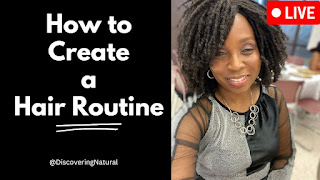How to Create a Hair Routine That Works
Creating a natural hair care routine involves several steps. Here's a basic guide to get you started:
Watch video
1. Determine your hair type: Understand your hair type, whether it's straight, wavy, curly, or kinky, as this will impact the products and techniques you should use. Click here to learn how to find your hair type.
2. Shampoo and Condition: Use a sulfate-free shampoo and a conditioner that suits your hair type. How often you wash your hair depends on your hair's needs; some people do it weekly, while others do it less frequently.
3. Deep Conditioning: Incorporate deep conditioning treatments into your routine. These help to moisturize and strengthen your hair. Use a deep conditioner once a week or as needed. You can rotate with protein conditioner to strengthen your hair.
4. Moisturize: Regularly moisturize your hair with leave-in conditioners and moisturizer, or natural oils like coconut, olive, or argan oil. This helps prevent dryness and breakage.
5. Protective Styles: Consider protective styles like braids, twists, or buns to reduce manipulation and protect your hair from environmental factors.
6. Minimal Heat: Limit the use of heat styling tools, such as flat irons and curling irons, to prevent damage. If you must use heat, use a heat protectant.
7. Detangle Gently: Use a wide-tooth comb or your fingers to detangle your hair when it's wet and saturated with conditioner to minimize breakage.
8. Trim Regularly: Trim your hair every few months to get rid of split ends and maintain healthy hair.
9. Avoid Harmful Ingredients: Be mindful of the products you use. Avoid products with harsh chemicals like sulfates, parabens, and silicones.
10. Eat a Balanced Diet: A healthy diet can contribute to the overall health of your hair. Consume foods rich in vitamins and nutrients like biotin, vitamin A, and omega-3 fatty acids.
11. Patience: Be patient with your hair. Transitioning to a natural hair routine may take time, and results may not be immediate.
12. Consult a Professional: If you're unsure about your hair type or have specific concerns, consider consulting a hairstylist who specializes in natural hair care. If you need one on one help, contact me by clicking this link .
Remember that everyone's hair is unique, so you may need to adjust your routine to suit your individual needs and preferences.



Comments
Post a Comment